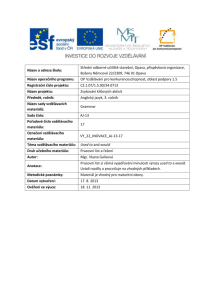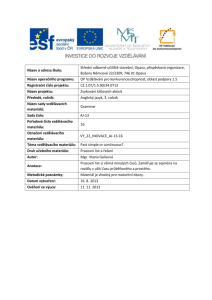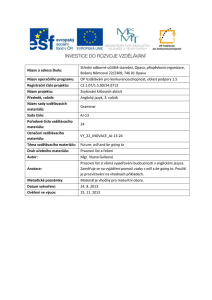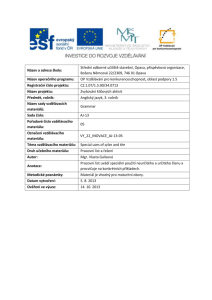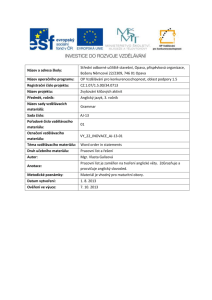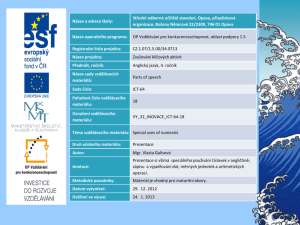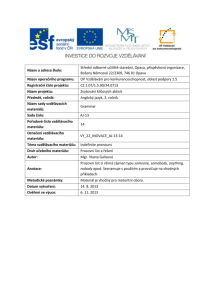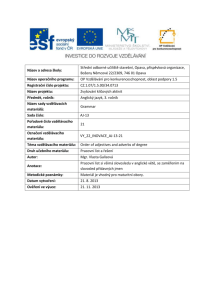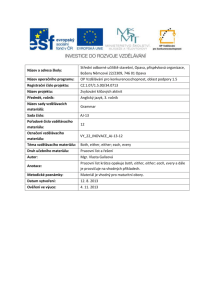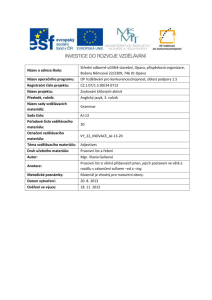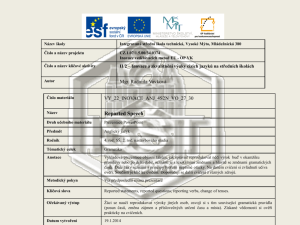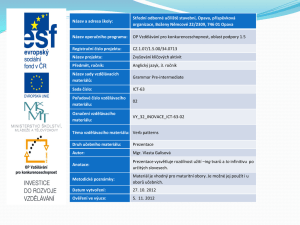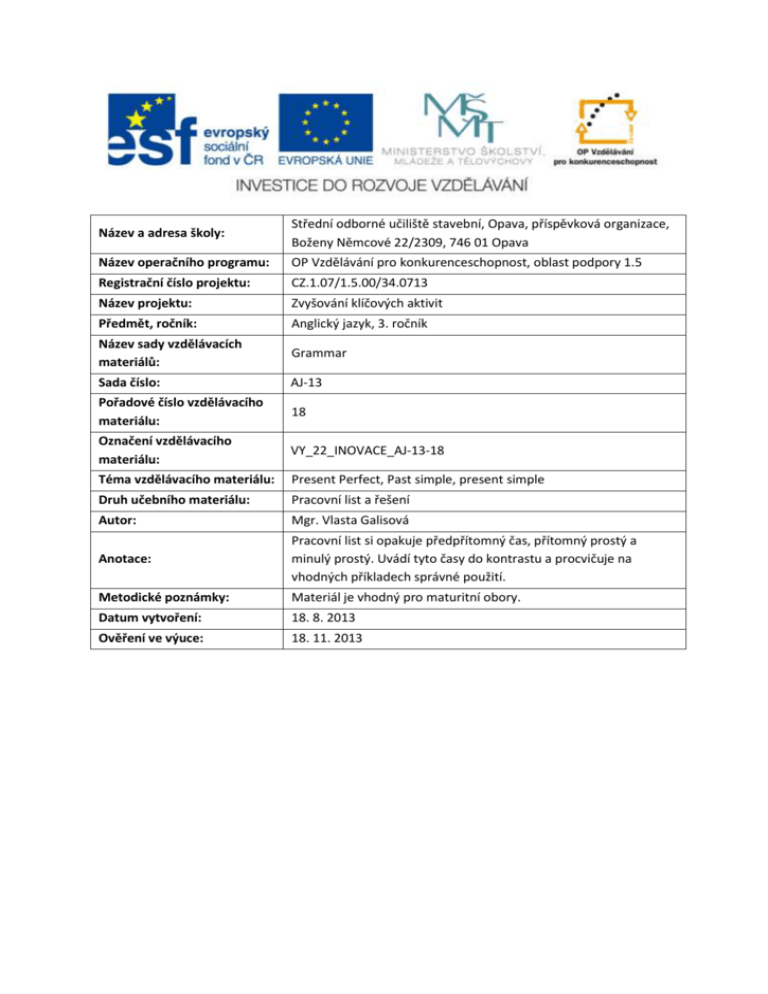
Název a adresa školy:
Střední odborné učiliště stavební, Opava, příspěvková organizace,
Boženy Němcové 22/2309, 746 01 Opava
Název operačního programu:
OP Vzdělávání pro konkurenceschopnost, oblast podpory 1.5
Registrační číslo projektu:
CZ.1.07/1.5.00/34.0713
Název projektu:
Zvyšování klíčových aktivit
Předmět, ročník:
Anglický jazyk, 3. ročník
Název sady vzdělávacích
materiálů:
Grammar
Sada číslo:
AJ-13
Pořadové číslo vzdělávacího
materiálu:
18
Označení vzdělávacího
materiálu:
VY_22_INOVACE_AJ-13-18
Téma vzdělávacího materiálu:
Present Perfect, Past simple, present simple
Druh učebního materiálu:
Pracovní list a řešení
Autor:
Mgr. Vlasta Galisová
Anotace:
Pracovní list si opakuje předpřítomný čas, přítomný prostý a
minulý prostý. Uvádí tyto časy do kontrastu a procvičuje na
vhodných příkladech správné použití.
Metodické poznámky:
Materiál je vhodný pro maturitní obory.
Datum vytvoření:
18. 8. 2013
Ověření ve výuce:
18. 11. 2013
Review:
Present Perfect
We make it using the verb have + past participle.
We use it to talk about recent events or a past event which the speaker
feels is connected with the present.
Past Simple
We use it to talk about finished action in the past.
Present Simple
We use it to talk about present fact or events.
Present Perfect vs. Present Simple/ Past Simple
We use the present perfect, not the present simple or past simple, for an
event or situation which began in the past and continues in the present,
when we want to say how much time it has been going on.
Harvard has been a university since 1636.
Go has two past participles: gone and been. There is difference in
meaning.
My sister has gone to London. (= and still is here)
My sister has been to London. (=and she came back)
We use the present perfect when we do not know exactly when the past
event took place, or it is not important. We use past simple to give details
later.
The typical word for present perfect are: since, recently, never, yet,
already, ever, for, lately, …
The typical word for past simple are: ago, in 2000, last week, on my
birthday, when, yesterday, …
Practice:
1. Complete these news stories with the present perfect and the past
simple.
0 John Bruce has won (win) three million euros in a lottery. He bought
(buy) the lottery ticket last Saturday and…
1 Princess Lola and Sir John ………… (marry). They ……. (meet) at the
party at Windsor Castle in 2009..
2 Cameron Bowie ………… (break) the 800m record in Oslo.
He….(run)1.40.23, the fastest time in the world.
3 Farmer Jamie Jo ………….(lose) all her sheep. She ……...(call) the
police last night but they ….
4 Pop star Rita Pee ……..… (go) to live in Greenland. The pop star ………
(say) that …
5 Builders Hansel and Gretel Sweet ……….. (build) a house out of sugar.
Work on the house …………. (start) two years ago and …
2. Underlined the correct option.
1 Let´s go out. The rain stops/ has stopped.
2 Alice lives/has lives in Newcastle for three years.
3 It is/has been my birthday today.
4 Jane doesn´t speak, hasn´t spoken German.
5 Jane doesn´t speak/hasn´t spoken to me for years.
6 Do you ever see/Have you ever seen my school photos?
7 I play/have played it twice.
8 This cake doesn´t taste/hasn´t tasted very nice.
9 England has/ has had a king or queen for more than 1,000 years.
10 Who thinks/has thought he knows the answer?
3 Write a few sentences about you. What you did yesterday, what do
you do regularly, where have you been, how long have you had…etc.
Use present perfect, past simple or present simple.
……………………………………………………………………………………
……………………………………………………………………………………
……………………………………………………………………………………
……………………………………………………………………………………
……………………………………………………………………………………
……………………………………………………………………………………
Key:
Ex. 1
1 have married 2 has broken, run
5 have built, started
3 has lost, called
4 has gone, said
Ex. 2
2 has lived 3 is 4 doesn´t speak 5 hasn´t spoken 6 have you ever seen 7
have played 8 doesn´t taste 9 has had 10 thinks
Ex. 3
Student´s own answers.
Literatura:
SWAN, M. Oxford English Grammar course intermediate. Oxford: OUP, 2011.
ISBN 978-0-19-442082-2.
DAVIS, F.; RIMMER, W. Active Grammar with answers Level 2. Cambridge:
CUP, 2011. ISBN 978-0-521-17599-9.
FOLEY, Diane Hall and Mark. My grammar lab. 1. publ. Harlow: Pearson
Longman. ISBN 978-140-8299-159.

